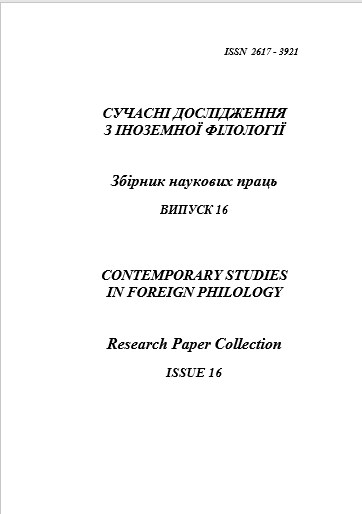SUBSTANTIVIERUNG DER VERBEN IN DER GEGENWÄRTIGEN DEUTSCHEN SPRACHE
DOI:
https://doi.org/10.24144/2617-3921.2018.16.%25pАнотація
Анотація. У статті йдеться про одну з тенденцій розвитку сучасної німецької мови – тенденцію до субстантивації дієслівних основ. Цей мовний процес збагачення сучасного словникового складу мови є активним та особливо простежується в публіцистичному стилі. Дослідження проведено на основі актуальної німецькомовної преси. Об’єктом дослідження виступають шляхи та моделі творення іменників від дієслів у сучасній німецькій мові. Проведений аналіз засвідчує, що словотворення іменників від дієслівних основ відбувається субстантивацією – інфінітива, дієслівної основи, однієї з основних форм дієслова безафіксним та афіксальним способом та шляхом словоскладання.
Ключові слова: словотворення, іменник, дієслово, інверсія, деривація, словоcкладання.
Abstract. The article considers one of the tendencies of development of modern German language – the tendency to substantiation of the verbal basis. This lingual process of modern vocabulary enrichment is active and particularly traces in the publicistic style. The research is conducted on the basis of current German press. The object of research is the ways and models of noun formation from verbs in the modern German language. The conducted analysis testifies that the word formation of nouns from verbal basis occurs by substantiation – infinitive, verbal basis, one of the main forms of the verb by non-affixed and affixed methods. The most productive type of word formation of nouns from verbs is inversion. Frequently verbal nouns are formed from the model “substantive infinitive”, “verb basis + suffix” and „composition“. From prefixed verbs the nouns are formed by non-affixed way. With the help of suffixes nouns are formed from the root of the verb.
Keywords: word formation, noun, verb, inversion, derivation, composition.
##submission.downloads##
Опубліковано
Номер
Розділ
Ліцензія
Автори, які публікуються у цьому журналі, погоджуються з наступними умовами:
- Автори залишають за собою право на авторство своєї роботи та передають журналу право першої публікації цієї роботи на умовах ліцензії Creative Commons Attribution License, котра дозволяє іншим особам вільно розповсюджувати опубліковану роботу з обов'язковим посиланням на авторів оригінальної роботи та першу публікацію роботи у цьому журналі.
- Автори мають право укладати самостійні додаткові угоди щодо неексклюзивного розповсюдження роботи у тому вигляді, в якому вона була опублікована цим журналом (наприклад, розміщувати роботу в електронному сховищі установи або публікувати у складі монографії), за умови збереження посилання на першу публікацію роботи у цьому журналі.
- Політика журналу дозволяє і заохочує розміщення авторами в мережі Інтернет (наприклад, у сховищах установ або на особистих веб-сайтах) рукопису роботи, як до подання цього рукопису до редакції, так і під час його редакційного опрацювання, оскільки це сприяє виникненню продуктивної наукової дискусії та позитивно позначається на оперативності та динаміці цитування опублікованої роботи (див. The Effect of Open Access).

